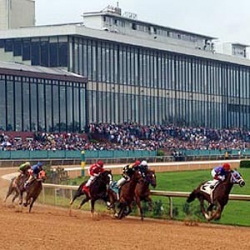In December, Oaklawn Park in Arkansas opened an online gambling website for people in the state. The site takes intrastate bets for racetrack events from around the globe.
The new website is called OaklawnAnywhere.com. Gamblers are allowed to place bets from their desktop PCs, tablet computers, or smartphones. The races involve not just Arkansas, but also US and international racetracks. Over the intervening five months, $9.1 million in bets were generated on the site.
Happy with the Return
Bobby Geiger, director gaming and wagering at the Hot Springs horse racing track, says the industry is pleased with the first five months. “We’re very happy with the response over the first five months.”
Geiger says Oaklawn Park wanted to legalize pari-mutuel wagering 10 years ago, but the Arkansas Legislatute continued its ban. Over that ten year period, the State of Arkansas saw zero revenues from betting, though betting was taking place on Oaklawn’s races through simulcast horse races on out-of-state websites.
2013 Online Gaming Law
This time around, the lawmakers realized that the government and the Arkansas horse racing industry sees $0 when people use the national websites, so they changed the laws to reflect a more pragmatic approach.
Geiger believes the national websites have generated about $30 million per year off of Arkansas bets in the past few years. Now, Arkansas is on a pace to collect over $21 million of those dollars, which translates to significant revenues for the state.
Southland Park
The same law which allows Oaklawn Park betting provides for online gambling involving Southland Park in West Memphis. Troy Keeping, Southland Park’s regional general manager, says his track will not be founding a websites. Keeping says, “It’s difficult to make a profit. The numbers, especially from a greyhound racing standpoint, don’t make sense for us.”
Family Council Reacts to Online Horse Betting
Jerry Cox of the Family Council has a much different opinion of the new law. Mr. Cox believes the politicians are worsening a social problem by passing the new law. “The convenience of it being on a smartphone, for people who already have a gambling problem, I believe it does compound that. It’s just like giving a person with any other addiction an easy way to feed that addiction. It just creates more problems.”
Proponents of Oaklawn Park’s online and mobile gaming platform would argue that smartphones can be used by people in Arkansas to gamble on the national websites, too. They would say the only difference is the state collects revenues. The Family Council believes the state should not sanction such activities for the sake of tax revenues, that moral concerns outweigh pragmatic concerns.
How U.S. Horse Race Betting Works
In 2000, the U.S. Congress passed amended the Interstate Horseracing Act. This allowed states to provide online gambling portals for horsetracks operating in the state. This seemed to clear the way for online horse betting, but US Justice Department at the time took a stringent view of such gaming. Then the 2006 UIGEA law was passed, which carved out an exemption for racetrack betting. Though the UIGEA shut down online casinos, poker sites, and sportsbooks, it opened the door for online horse betting.
That did not mean states automatically allowed such activities. It took Arkansas seven years to address the question.
Horsetrack Betting in Other States
Various U.S. states have taken quite different approaches to gambling at their state-sanctioned horse tracks and dog tracks. In states like Pennsylvania, Massachusetts, and Rhode Island, racetracks are allowed to have slot machines. In New York, they call these machines video lottery terminals, but they have a bingo-style component to them. Still, the casual observer would think they are slot machines. Even the casual gambler might think so, because the screen looks like a slots game, but with a video bingo card in the corner.
Delaware has three horsetracks. In the 2000’s, the state allowed gaming machines in the facility, to help raise additional cash for the facilities. In 2012, the state gave licenses for online gambling to these venues. Now, each of Delaware’s racecourses have their online online casino and Internet card room.
For a time, these sites only allowed intrastate gaming. In March 2014, Delaware signed an interstate poker compact with Nevada, so the two states share customer lists for their iPoker rooms. The numbers remain small, so Delaware’s gaming sites continue to struggle with their revenue flow. This year, a $20 million tax relief bill for the 3 racetracks is set to become law.

